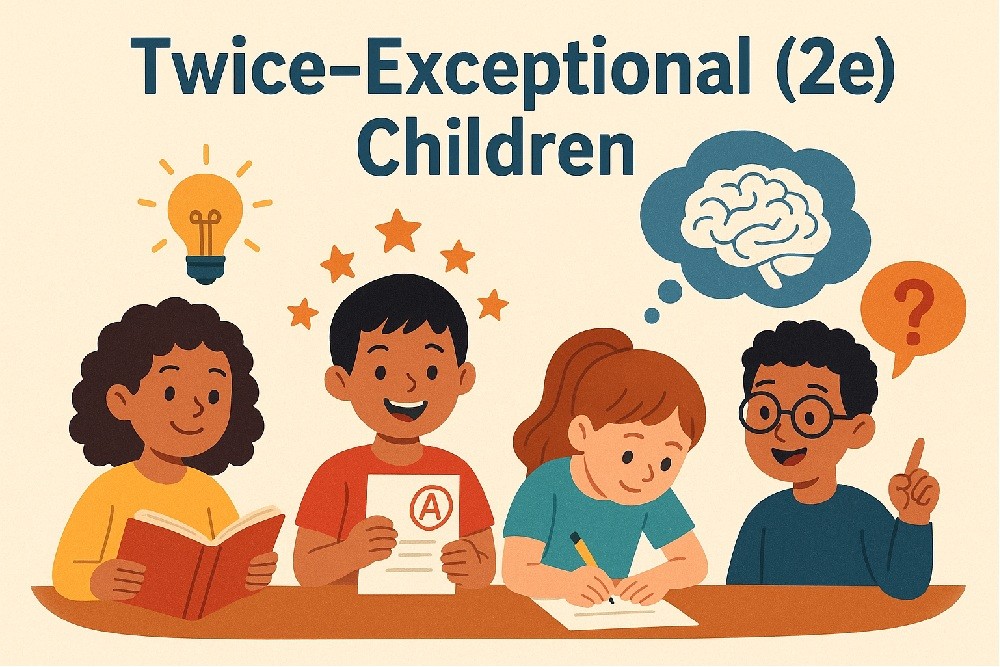Understanding Twice-Exceptional (2e) Children
Children with "twice exceptionality," or 2e, are a commonly overlooked and educationally underserved group.
Although not a formal diagnosis in itself, twice-exceptionality describes individuals who possess significant intellectual talents in one or more areas while also meeting criteria for a learning or developmental disability. These children might excel in math, writing, music, critical thinking, scientific reasoning, or creative pursuits. They often perform above average in one or many school subjects but struggle considerably in others. Alongside these talents however, 2e individuals experience one or more neuropsychological challenges, including ADHD, dyslexia, dyscalculia, autism spectrum disorder, sensory processing disorder, etc. When this imbalance between strengths and challenges goes unrecognized, it can lead to diagnostic confusion, emotional distress, and behavioral difficulties.
Why 2e Children Are Often Missed
Twice-exceptional children are frequently missed or inadequately supported in school as their symptoms may be mistaken for other diagnoses. If a child appears gifted but their deficits are not attributed to an identified disability, they may appear lazy and often face criticism for lack of motivation. These children may also utilize their intellectual strengths to mask their challenges. If placed in a gifted program, they may still struggle in some areas, which can lead to confusion and frustration for both the child and educators.
Conversely, a 2e student identified as having a learning or developmental disability may be placed in an educational program that fails to challenge and enrich them in areas where they would excel. These children's disabilities cause their talents to be overlooked, and they may grow bored or restless in their special education program. This boredom and restlessness can cause a child to appear fidgety and distracted in class, closely resembling the behaviors exhibited in children with ADHD. Additionally, gifted children often have intense interests, increased sensitivity to stimuli, and difficulty interacting with others, which can resemble Autism Spectrum Disorder. These individuals may be diagnosed with ADHD or ASD respectively without receiving recognition for their twice-exceptionality.
Distinguishing Gifted from Twice-Exceptional Learners
While a gifted child demonstrates exceptional ability in one or multiple subjects and an IQ score typically above 130, they do not face difficulties caused by a developmental or learning disability. Beyond meeting diagnostic criteria for such a disorder, some key characteristics of twice-exceptional children include:
● Advanced reasoning and problem-solving capabilities
● Heightened sensory responses to environmental stimuli
● Intense curiosity and intellectual inquisitiveness
● Exceptional focus on topics of interest
● Difficulty with literacy skills due to processing differences
● Social challenges and difficulty navigating relationships
● Lowered self-confidence stemming from perfectionist tendencies
● Behavioral difficulties emerging from frustration, boredom, or disengagement
Proper Identification and Assessment
In order to properly identify 2e children, it's best to use a holistic approach that considers intellectual, emotional, social, and behavioral factors. Schools and professionals should use a combination of written tests, behavioral assessments, formal assessments like structured tests and quizzes, and informal assessments through observation and progress monitoring. If IQ tests are used, it can be helpful to analyze results by section, as 2e children may perform significantly higher on some portions of the exam than others.
The most comprehensive way to identify twice-exceptionality is through neuropsychological evaluation. This type of testing involves a thorough review of an individual's emotional, cognitive, and behavioral functioning and can reveal a multidimensional picture of a child's strengths and challenges. This detailed assessment provides the foundation for creating truly effective support strategies.
Supporting Twice-Exceptional Children
Once identified, it's essential that 2e children are provided with ample and appropriate guidance through educational and extracurricular programming. Implementing an Individualized Education Plan (IEP) in school can be an excellent way to ensure a twice-exceptional child receives the support they need. Schools can provide these children with individualized learning materials or environments, extra help with daily planning and organization, modified timelines for learning and skill progression, and alternative ways for students to demonstrate their understanding and progress apart from typical homework assignments or assessments.
Outside of school, 2e children may benefit from extracurricular activities and resources that cater to their interests and bolster their skills while still providing support for deficit areas. This can help boost confidence and allow children to connect with others facing similar challenges. Whether it's an advanced robotics club with built-in organizational support or a creative writing program with accommodations for dyslexia, these experiences validate both sides of a twice-exceptional child's identity.
The Path Forward
Twice-exceptional children possess remarkable gifts that deserve to be nurtured alongside very real challenges that require understanding and support. When properly identified and supported, these children can flourish, using their talents while receiving the accommodations they need to overcome their challenges. If you suspect your child may be twice-exceptional, or if you're an educator working with a student who fits this profile, seeking a comprehensive neuropsychological evaluation is an important first step. Every child deserves to be seen and encouraged in all their complexity.
References
Arky, B. (2024, December 17). Twice-exceptional kids: Both gifted and challenged. Child Mind Institute. https://childmind.org/article/twice-exceptional-kids-both-gifted-and-challenged/
Davidson Institute. (2021, May 31). Twice exceptional: Definition, characteristics & identification. Davidson Gifted Blog. https://www.davidsongifted.org/gifted-blog/twice-exceptional-definition-characteristics-identific
Howard County Public School System. (n.d.). Twice-exceptional learners. https://www.hcpss.org/academics/gifted-and-talented/twice-exceptional-learners/



